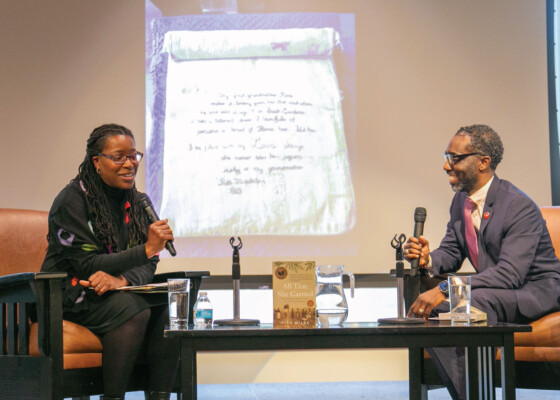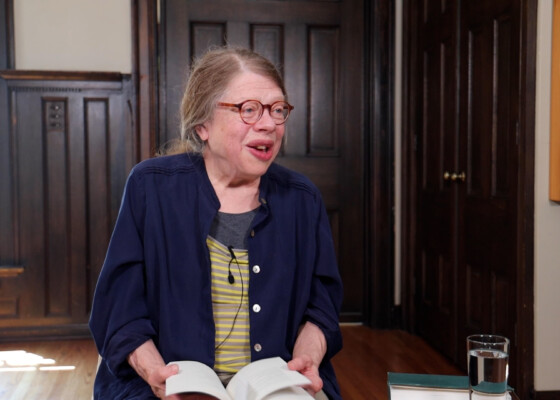Dr. Grandin ticket winners: The power of visual thinking
May 2, 2011This entry is a component of the three-part blog series following Dr. Temple Grandin’s presentation at the Indianapolis Museum of Art April 28. To visit the other posts click here….
This entry is a component of the three-part blog series following Dr. Temple Grandin’s presentation at the Indianapolis Museum of Art April 28. To visit the other posts click here.
Dr. Grandin’s insight concerning livestock handling facilities and animal welfare made the event an ideal Food for Thought topic. Indiana Humanities’ blog readers were asked to tell us how listening to Dr.Grandin would help them better understand the world around them and why it’s important. The two winning comments received two tickets to see Dr. Grandin speak at the IMA as part of the Planet Indy series. Here is a look at Susan Adams’ comment that won her two tickets:
My 21-year old son is on the Autism spectrum. I would dearly love for him to get a chance to hear such an amazing role model in person. It would mean the world to him to see Temple Grandin at a time when he is trying to understand his contribution to the community and to the world. Thanks for considering my request.
Susan and Caleb’s response to hearing Dr.Grandin speak:
After hearing Dr. Temple Grandin, my son, Caleb, and I decided we needed to debrief the event. I asked Caleb what stood out to him from Dr. Grandin’s talk. Caleb was very impressed by her work with meatpacking plants and her detailed observations of animal behavior. He made comparisons to his own different ways of relating to our family dog and to the way his mind sees what he is trying to learn. For example, Caleb is really interested in cars and racing, so when he studies a fuel injector or drifting, he says he sees those things working in a series of quick frames like those Dr. Grandin described in her presentation. That was a new insight for me into the way Caleb sees the world.
Dr. Grandin spent a lot of time talking about the power of visual thinking and emphasized that the best work gets done when several kinds of thinkers work together. As a teacher and teacher educator, I could not agree more, but I wonder how to explain this logic to the Indiana Department of Education, who only seems to know how to assess one kind of performance. I found myself wondering how to make space and respect for visual thinkers in a world driven by linear thinkers? I wondered how Caleb can find a way to move from merely taking in rich visual images to producing ideas or products resulting from his visual thinking. And as his mom, I can’t help but wonder how he will find a way to make a decent living in a place where his gifts and contributions are maximized, respected and appreciated. This is the point where we both mentioned Dr. Grandin’s realization that she had to show people her work before they would listen to her–a point we both understood very well, given some of the struggles that several autistic people experience when attempting to communicate.
We both appreciated Dr. Grandin’s call to teach autistic children to be polite and to interact socially in turn-taking and sharing. This affirmed some of my parenting decisions with Caleb as a young child and is perhaps why he is so social today. We have both been watching the child character with Asperger’s on NBC’s Parenthood with great interest and sometimes with dismay as the character is portrayed as prone to violent outbursts while the parents watch helplessly. Caleb and I appreciate that NBC is calling attention to autism, but we hope that more thinking like Dr. Grandin’s will emerge. In fact, NBC should call Dr. Grandin because they could learn a thing or two from all that Dr. Grandin’s wise mother did during her childhood.
In summary, we thoroughly enjoyed the evening and found much to encourage and inspire us. Now we want to see the movie and read some of Dr. Grandin’s books to see what else we can learn from her. How encouraging to see Dr. Grandin generously share how she has learned to live in her own skin, contribute such important, critical work to the world, and remain true to herself in the process. Thanks for allowing us to participate in such a rich, relevant evening!
Susan and Caleb Adams, mother and son, have lived in Irvington on the east side of Indianapolis with Caleb’s siblings, Isaac and Hillary Adams, since 1988. Caleb is a 2008 graduate of Indianapolis Metropolitan High School and has been attending both Indiana State University and Ivy Tech. Susan currently is the Project Alianza Director in the College of Education at Butler University. The whole family is actively engaged in the Near Eastside community through their membership at Englewood Christian Church. Caleb was diagnosed on the high functioning end of the Autism spectrum in 2002.


